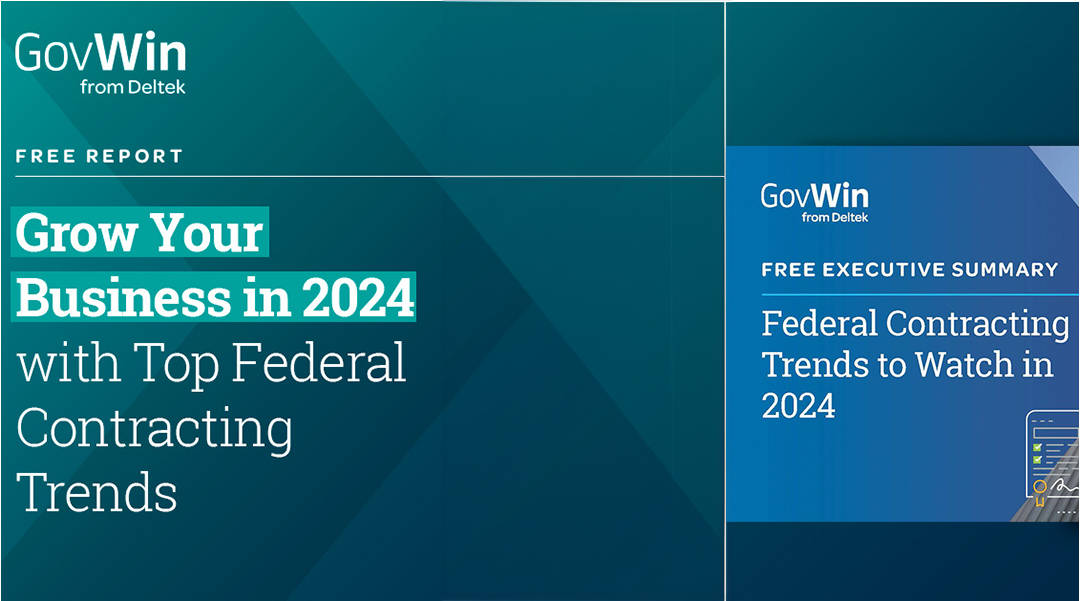With the 2023 calendar year behind us and federal agencies well underway with their plans for 2024, it’s a good time to take stock of the coming year and examine the topics most relevant in federal government contracting today. Government contractors seeking to empower their federal business development teams need to stay on top of the latest trends to develop their go-to-market strategy in 2024 and win more government business.
In this article, we will review the top federal government contracting trends that we expect to make the greatest impact on the GovCon market in 2024. These trends were presented in our recent webinar – hosted by Kevin Plexico, Deltek’s SVP of Information Solutions – and are supported by data from the industry-leading GovWin IQ platform of government market intelligence.
If you’re trying to ensure that your federal government contracting business is best prepared for what is to come this year, take note of these ten trends and ask yourself if you have the knowledge and tools you need.
10 2024 Trends Set to Impact Federal Contracting
- Budget Uncertainty – Continuing resolutions, conflict about general spending levels and specific priorities, and potential changes in congressional leadership and/or appropriations committee leadership are expected to impact the federal budget plans of federal government agencies.
- Inflation and Interest Rates – Over the past few years, government contractors have dealt with rising costs in goods, energy and talent. In 2024, inflation rates are showing signs of decline and the cost of inputs for manufacturers is becoming more stable.
- Small Business Opportunities – The Biden Administration continues to pressure agencies to elevate small business federal contracting, eliminate barriers to entry and produce more opportunities for small disadvantaged businesses. The Small Business Administration (SBA) plans to improve performance monitoring, reporting of 8(a) participants and fraud reduction.
- The Environment for GWAC/MAC – Contract consolidation, category management effects and Best-in-Class contract impacts, small businesses accessibility concerns, and the White House’s Better Contracting Initiative influence the competitive landscape.
- Artificial Intelligence – AI’s transformative impact on agency missions will drive continued investment. The Biden Administration’s recent AI EO is comprehensive guidance for federal implementation and risk management of AI technologies and prompts legislative action to push for responsible AI innovation.
- Cybersecurity – Oversight, reporting and compliance requirements for product and service providers are some of the many policies and initiatives that federal governments are more strongly implementing to achieve government-wide cybersecurity objectives.
- Supply Chain – Global supply chain issues, initiated by the COVID-19 pandemic and sustained by the Ukraine/Russia war and other world events, have made it a top federal priority to ensure the resilience and trustworthiness of the U.S. supply chain.
- Workforce Challenges – Governments and private sector businesses are facing similar workforce challenges, including recruiting, diversity, wage competition and skill development. The federal workforce remains at a disadvantage to the private sector, especially in the technology industry.
- Customer Experience – Legislation and policy from both Congress and the White House are powering more IT spending to modernize legacy systems, as improving how citizens interact with federal agencies has become a top priority.
- Federal Elections – 2024 is an election year, and the upcoming presidential and congressional elections will highlight the wide gulfs in policy, spending and acquisition priorities between major parties and candidates, which can impact how and how often acquisitions happen.
Key Takeaways for Government Contractors
The federal government contracting market could be in a very different place at the end of 2024 than it is now at the beginning of the year. The results of the upcoming federal elections will obviously have a major impact, and there remains potential for major congressional gridlock that could hold up government spending. At the same time, The Federal Reserve anticipates inflation to continue to decline in 2024, which has led to cautious optimism regarding overall economic health.
This list of trends is just the tip of the iceberg, as understanding all the forces impacting the federal contracting market is a huge challenge without the proper support and guidance. Deltek’s full Federal Contracting Trends to Watch in 2024 report explains the diverse factors shaping the federal contracting market landscape for 2024, which will impact opportunities, competition, and the cost of doing business. The report provides recommendations to guide solution providers in maximizing their market positioning to best take advantage of federal business opportunities.
Sellers to the federal government have a wealth of opportunity to continue their government business. The trends and challenges outlined here will further complicate an already complex landscape for federal contractors in 2024. By understanding how the federal market is shifting in 2024, and by leveraging data-backed tools like Federal Market Analysis from GovWin IQ, forward-thinking businesses can still position themselves competitively to grow their federal government sales revenue.
Deniece Peterson is Sr. Director of Federal Market Analysis at Deltek, leading an analyst team responsible for GovWin’s strategic research and analysis of federal budgets and spending, market trends, technology and acquisition policy, and business development best practices.



Join the Conversation